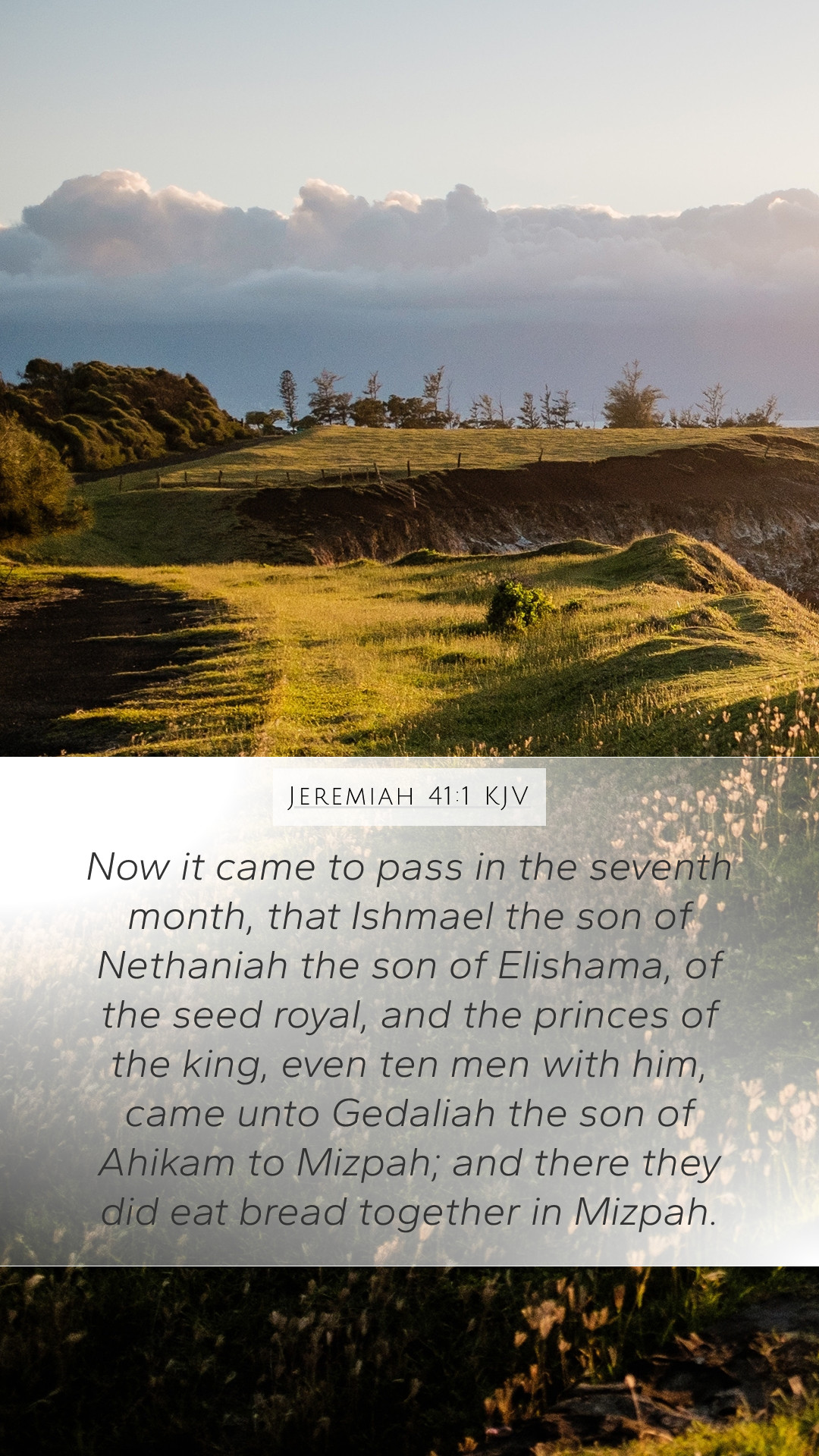Understanding Jeremiah 41:1
Jeremiah 41:1 states: "And it came to pass in the seventh month, that Ishmael the son of Nethaniah, the son of Elishama, of the seed royal, and the princes of the king, even ten men with him, came unto Gedaliah the son of Ahikam to Mizpah; and there they did eat bread together in Mizpah." This verse serves as a significant juncture in the narrative of the fall of Jerusalem and the subsequent actions of its leadership.
Bible Verse Commentary
This chapter introduces Ishmael, highlighting his royal lineage and connections to the former king. Ishmael’s actions illustrate the chaotic aftermath of Jerusalem's destruction and the struggles for power in a devastated nation.
Contextual Analysis
Historically, the events unfold shortly after the fall of Jerusalem as a consequence of Judah's idolatry and refusal to repent. Gedaliah, appointed as governor by the Babylonians, represents a fragile hope for stability. However, Ishmael’s intent reveals a challenge to this order.
Insights from Matthew Henry
Matthew Henry emphasizes that Ishmael's lineage signifies a remnant of royal authority and ambition amidst chaos. His actions are driven by personal motives–possibly revenge and the desire to assert his position. The meal shared between Ishmael and Gedaliah can be seen as a deceptive act, cloaking treachery in the guise of diplomacy.
Albert Barnes' Observations
Albert Barnes points out the significance of the seventh month, observing that it hints at the Jewish calendar's importance in the backdrop of these events. Barnes also mentions Ishmael’s connection to royal lineage, suggesting a claim to legitimacy—amplifying the tension in the power dynamics of the remnant left in Judah.
Adam Clarke’s Commentary
Adam Clarke discusses that Ishmael's aim might have been to secure the loyalty of the people by subverting Gedaliah, indicating a power struggle rooted in jealousy and misguided ambitions. Clarke points out how the act of sharing bread symbolizes a false friendship leading to tragic outcomes.
Meanings and Interpretations
This verse serves as a pivotal moment reflecting themes of betrayal, ambition, and political intrigue. The very act of a royal figure dining with a governor highlights the precariousness of their alliance and the consequential retributions that follow.
Historical Context
Understanding the historical context circumscribes the reading of this verse. The Jewish nation had just experienced traumatic upheaval from Babylonian conquest, leading to a void in leadership and rampant insecurity among the surviving populace.
Spiritual Significance
The spiritual implications of this verse stretch beyond its immediate narrative. It encourages readers to reflect on the integrity and stability of their own leadership and relationships. There is a call to discern true motives in alliance and authority, reinforcing a biblical principle of knowing the intentions behind actions.
Cross References
- Jeremiah 40:6: Discusses Gedaliah's appointment and the gathering of the remnant.
- 2 Kings 25:25: Relates Ishmael’s actions to the broader narrative of Jerusalem’s fall.
- Jeremiah 41:2: Continues the account of Ishmael's betrayal against Gedaliah.
- Zechariah 8:10: Provides hope regarding restoration after such turmoil.
- Matthew 26:47: Similar themes of betrayal highlighted in the New Testament.
Application of the Verse
For modern readers, the verse prompts reflection regarding the nature of trust and leadership. As it illuminates the potential for deception within apparent alliances, it encourages a discerning heart that looks beyond surface-level intentions.
Conclusion
Jeremiah 41:1 opens a crucial chapter in understanding the dynamics following Jerusalem's fall. The combined insights from biblical commentaries emphasize the themes of betrayal, leadership struggles, and the consequences of ambition. Engaging with this scripture can yield significant lessons, particularly in the realms of personal integrity and the implications of our associations.


